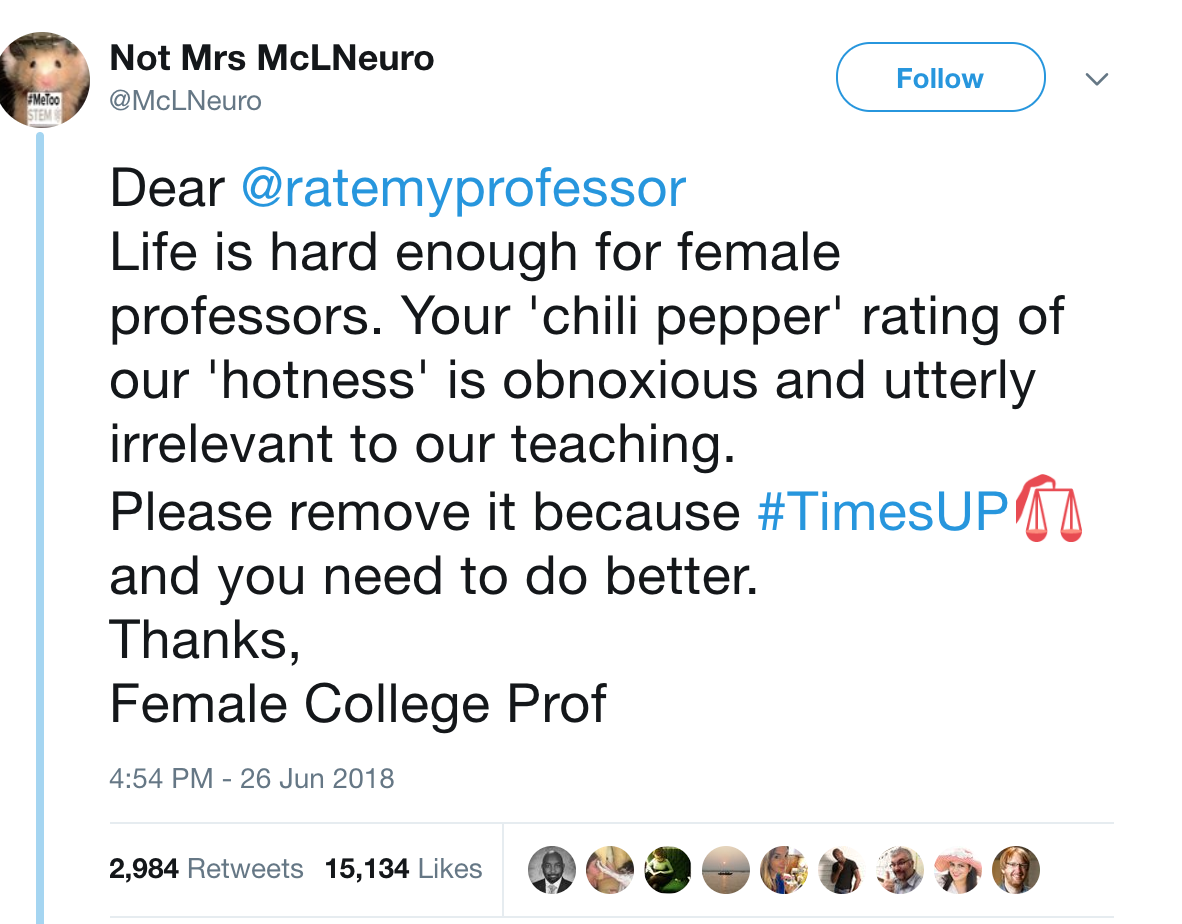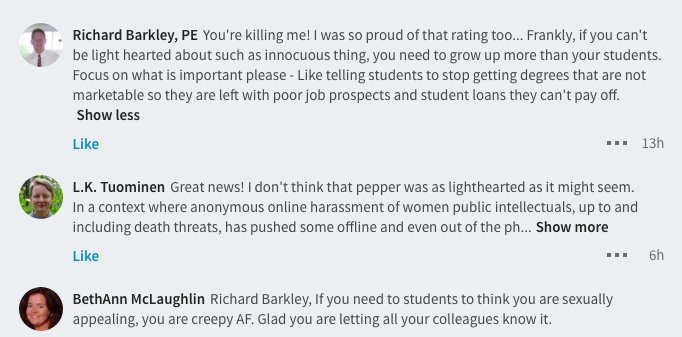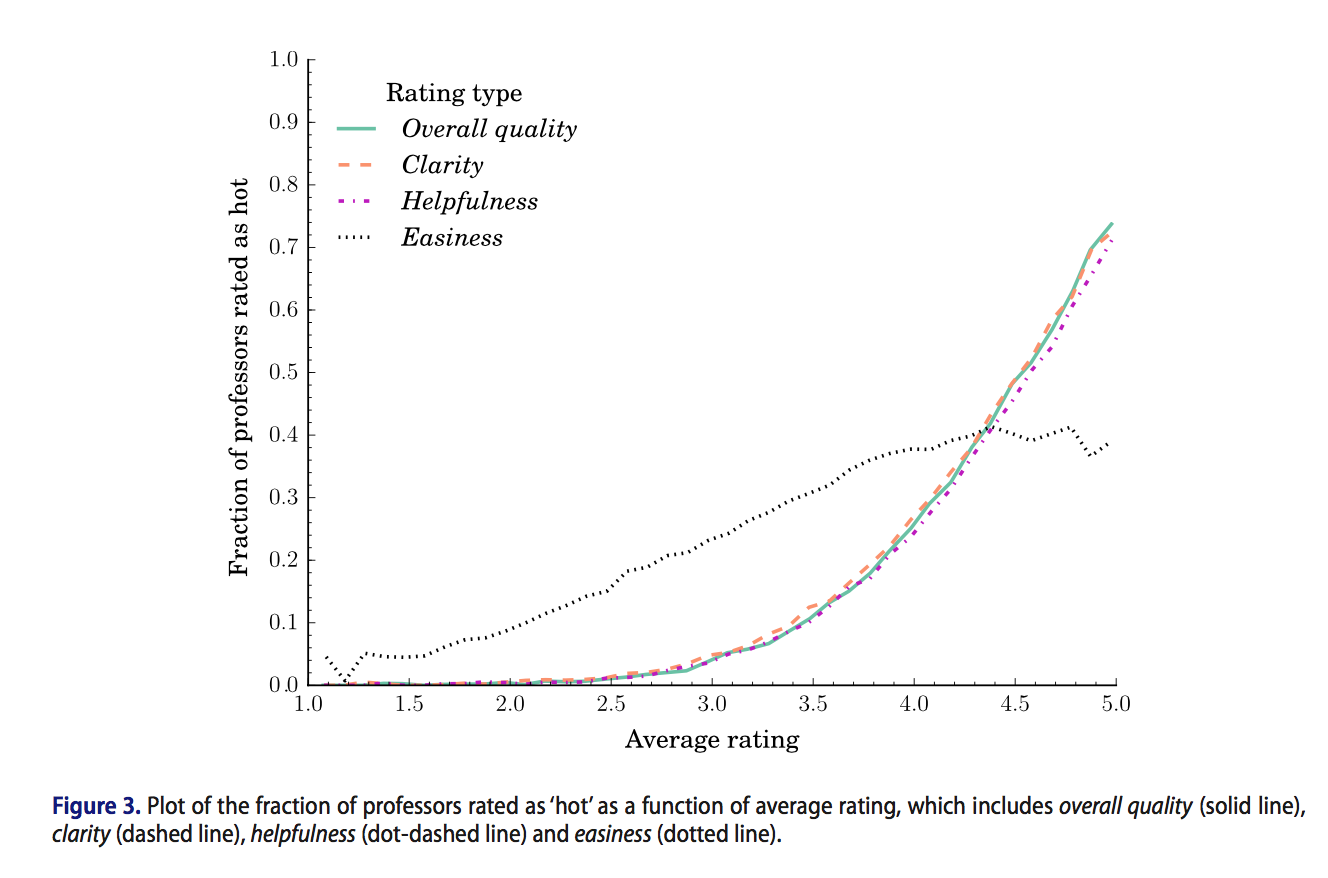The website RateMyProfessors.com killed the "chili pepper" rating that allowed students to rate a professor's "hotness." The website removed the rating that has been a mainstay for years after a complaint from BethAnn McLaughlin, a Ph.D. neuroscientist and assistant professor at Vanderbilt University.
McLaughlin, who studies "cell signaling pathways related to neurodegeneration and protection," said the "hotness" ratings "were more than just numbers to me." She told me that, surprising as it may seem, schools pay attention to RateMyProfessors' comments when they are making decisions about tenure and promotion.
McLaughlin might not have called on RateMyProfessors as she did except that the National Academies of Science, Engineering and Medicine just published a deep study of sexual harassment on college campuses. The study found that colleges and universities are second only to the military in reported cases of sexual harassment. It cited research that said "40 percent of medical students experienced sexual harassment from faculty or staff."
"You have a choice sometimes," she said. "You can get angry or you can take action."
She took action. She wrote in a post for EdgeforScholars.org:
It was painfully clear in that moment that the failure to respect women in academics was ingrained far too early in our young men. RateMyProfessors is one of the earliest opportunities for students to exert very public power over our careers and reputations. Giving us chili peppers is degrading. Put simply, my single mother did not put my brother and me through college and graduate school for 25 years so that I could be measured by a vegetable.
So, June 26th, she posted a call to action on Twitter.

15,134 likes, 2,984 retweets and 48 hours later, the website responded.

And poof, the chili pepper rating that has been a highly promoted feature of the nearly 20-year-old website was gone.
Even then, she was called out on social media for taking the "hotness rating" too seriously. She fired back.

Lisa Taylor, a respected journalist, lawyer and assistant professor at Ryerson University in Toronto, told me she checks RateMyProfessors once in a while.
"I check to make sure there's nothing seriously defamatory — not low-level kvetching, but serious stuff," she said. "Everything around appearance — and in fact, more than many people might realize when it comes to faculty performance measures — is gendered. A female prof from the University of Guelph recently tweeted about how she and her prof husband each had to bring their baby to lecture after their childcare fell through. In their respective student assessments, she was called 'unprofessional' for coming to class with baby in tow, while their child's appearance in her husband's class was described by one student evaluator as 'the highlight of the course.'"
Roxanne Dill, a journalism instructor at Louisana State University's Manship School, was also glad to see it go.
"How much do I hate them? A full five chili peppers of hot hate for it. It objectifies people and robs them of dignity, both the prof being rated and the students who are doing the rating," she said.
"I do think these ratings affect teachers because we take seriously what our students think about us. We want their learning experience to be memorable — in a good way. When I first saw the hotness ratings, I thought, 'Who created this? The guys from 'Animal House'?' I visited around the site to check out teachers I knew and some I didn't know, and it looked like students who were serious about commenting didn't pay attention to the chili pepper rating. However, the ones who are intent on hurting a professor's reputation and future relationships with students could do a lot of damage with their ratings (words and chili peppers)."
Lyn Millner, who founded the journalism program at Florida Gulf Coast University, agreed.
"I do think that women tend to be taken less seriously, which is a bigger problem," she said.
Like Taylor, she keeps an eye on what students are writing on RatemyProfessors.
"I do check the site very occasionally just to see whether there’s something useful there, or terribly inaccurate," she said.
One study of 7.9 million RateMyProfessors scores for 190,000 professors found that students rated male teachers higher than female teachers and the teachers who students said were "easy" rated higher than those who were not. The same study also showed that the teachers who were rated "hot" scored higher on other RateMyProfessors scales.

"It's gross, but I'm not remotely surprised. There's no shortage of research that tells us, regardless of circumstances, attractive people are seen as more capable/competent than those who are considered unattractive," Taylor said about the intersection of "hotness ratings" and students' perception of a teacher's performance. "Students, and all of us, should be pushed to reflect on our unconscious biases."
Syb Brown, an author and journalism professor at Belmont University, said that while the research on the effects of perceived attractiveness is consistent, the chili peppers could have served a purpose.
"As much as I detest the findings and the ratings, my feelings do not negate them. In a twist of fate, the chili pepper rating system could have been used to provide the data some faculty need to prove bias based on physical attractiveness," she said. "It would be wonderful for this archaic measurement to go the way of the swimsuit competition."
Brown said the ratings could affect teachers' performances.
"Indeed if monitored like a Facebook feed, the rating system could have a more pronounced negative effect," she said.
McLaughlin told me that as much as educators like her loathe RateMyProfessors, "universities got what they deserve on that one." She says educators collect student evaluations at the end of the semester but never make the results visible.
"We don't tell students we heard them or how we will respond to their concerns," she said, so websites that allow nameless snarky evaluations became the default method for students to hear who they should choose or avoid.
Louisiana State University's Roxanne Dill offered some perspective to all of this.
"My son, who was a college student when I first started teaching, said 'never check that stuff, mom. People are mean.' But I did check once out of curiosity. Alas, I didn't get a chili pepper rating. Not one," she said.
I have known all of the journalism professors I spoke with for this story for more than a decade, in some cases, two decades. Each has a reputation for innovative, effective teaching and mentoring students. Which is why what Dill says resonates with me.
"Do 'hot' teachers get better teacher ratings?" she asked. "This is just an opinion, but a teacher who values 'hotness' might also be more inclined to want to win a popularity contest with students, which means being the type of teacher who gives students fun, good grades, and few challenges. However, students who want to learn soon realize they can have good times at Fred's bar, and the hot teacher is not the person they seek out when they need mentoring."







